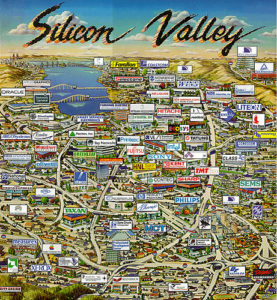Warning: Fairly lengthy article, something of a rant, and I’m going to say “bullshit” quite a few times. Buckle up, buttercup…
In Guy Kawasaki’s book, Reality Check, he claims “Silicon Valley is a meritocracy like nowhere else.” Bullshit. Look at the lack of women, minorities, over-40. If it’s a meritocracy, then explain statistically impossible under-representation. Tech companies aren’t examples, they’re poster-children for how not to “do” diversity.
Diversity. Inclusion. As important as these words are, Tech just doesn’t get it. Even while company leaders tout the need to increase diversity for both business and social justice reasons and trip over each other trying to hire the biggest, baddest diversity guru, the better roles and big bucks are reserved for keepers of the bro culture. Considering that most of the industry is nearly evangelical about progressive change, it’s downright hypocritical.

Let’s start with some representative facts:
- The U.S. population is approximately 51% female; Silicon Valley employs just 20% of women in technical positions.
- African Americans make up 13.2% of the U.S. population; Silicon Valley employs less than 4% African Americans in technical positions.
- Hispanics make up 17% of the U.S. population; Silicon Valley employs just over 4% Hispanics in technical positions.
- Asians make up just over 6% of the U.S. population; Silicon Valley employs almost 40% Asians in technical positions.
- Hispanics and African-Americans constitute a combined 14 percent of computer science and engineering graduates—but only 5 percent of the tech workforce.
- Top universities turn out black and Hispanic computer science and computer engineering graduates at twice the rate the leading tech companies hire them. (read this one twice)
Tech companies have been promising to “get better” now for almost a decade. So, a seemingly fair question… how much improvement on the numbers of women and people of color?
How’s this for an answer… Nothing. Zip. Nada. Bupkis. Ok, in all fairness, some numbers have moved ever-so-slightly. But I guaran-damn-tee that the amount of movement would be called “remained flat” in any financial results analysis.
If one of these tech firms had a critical financial metric scrutinized by their Board, and was unable to improve that metric at all in two years… how deep of analysis would be in play to satisfy the Board? What do you think would happen to the executive team? Whacked, is what would happen. Adios amigos.
At Facebook, Black/African American and Hispanic/Latino (as EEO categories) remain substantially the same (2% and 4% respectively) as 2012, although Facebook’s headcount has grown almost 350% during that same time. 350%! Female employment is up a single percentage point during that same time.
In 2014, Facebook Diversity Czar Maxine Williams wrote “So at Facebook we’re serious about building a workplace that reflects a broad range of experience, thought, geography, age, background, gender, sexual orientation, language, culture and many other characteristics.”
Yeah… I’m calling bullshit.

This behavior is just the recent stuff, and only notable because it’s already in the news. As any who work in HR will tell you, if there’s “one or two,” there’s damned sure more.
Tell me again how diversity and inclusion within tech companies is a priority, and that they are doing “everything they can” to improve. Another bullshit call.
If I seem a bit ticked about this stuff, I am. And those who know me, know that I’m not a huge fan of diversity program efforts. But dammit, this is an industry who frequently holds itself up — and above others — as a beacon for social change and progressive improvement. And they’re frauds.
Here I am, in Houston Texas. Though incredibly diverse, many others don’t see my city in that regard. Saddled with the legacy of oil & gas and drilling mavericks, many believe that the good old boy network still runs at full speed here. It doesn’t, and as a matter of fact, Houston blows Silicon Valley out of the water when it comes to workplace diversity and inclusion.
According to the US Census Bureau to look in the valleys tech workforce is less than 3% black and just over 4% Hispanic. I’m from backwoods Houston, supposedly a bastion of good old boys (read: middle-aged white guys), and our tech workforce is 11.9% black and 12.6% Hispanic. We rank #1 for minority entrepreneurs.
In fact, almost every major metropolitan area in the country does a better job employing black and Hispanic tech workers than Silicon Valley. Houston, I think there’s a problem… in Silicon Valley.
And please, no crap about locally available talent. Silicon Valley has almost 3 times as many Blacks and Hispanics with degrees than employees, while employing four times the number of foreign nationals than black and Hispanic.
We cannot continue to accept microscopic improvements as advancement. I’ll say again: if tech executives and investors believed the poor diversity showing to actually be a major limiting factor to the company, they would put the effort and resources behind it and fix it. Until that occurs, we’ll just get more lip service.
Okay, why is this such an intractable challenge?
Personally, I doubt their sincerity. I don’t think they lay awake staring at the ceiling, agonizing over the lack of diversity at their organization. I think pledges they make publicly, and other idiotic moves like publicizing diversity goals, are simply an attempt to appear responsive to media accusations that racism and sexism just continue to permeate the tech industry.

I think it’s hysterical that some tech firms — Facebook, for example — actually blame the education pipeline for their inability to hire an equitably diverse workforce. Think about the sheer irony here… Mark Zuckerberg Facebook CEO is not a college graduate (nor is his cofounder Dustin Moskovitz). Bill Gates, Microsoft founder, another non-graduate, as is Tony Hsieh of Zappos.
Don’t even get me started about John Mackey, Larry Ellison, Michael Dell, Richard Branson, Howard Schultze or Walt Disney. I’m not advocating dropping out of college, but I am saying you cannot use lack of diverse college graduates—even if true—when most technology and innovation has come from non-college graduates.
It’s the culture, folks. It’s broken, and must be fixed, and morph into something where diversity and inclusiveness are absolutely central to the success of the organization. Making diversity a bolt on statistic to a workforce will simply not work. Negative messaging—incentives, threats—don’t work.
Compliance is not enough… a culture shift is required, and that can’t come solely through compliance. Some starting points:
- Consequences matter. Both positive and negative.
- HR must change the focus to conversations, dialog and the commitment to diversity as a success competency, not a best-places-to-work soundbite.
- Candidate sourcing—change it, get better… This isn’t that difficult. You don’t recruit at a junior-college for ivy-leage graduates, because they aren’t there. Shift to target-rich sourcing environments.
- Modify the culture to retain diverse employees. Issues must be able to be raised without consequence (opposite of Google’s latest debacle). Failure without fear. Mentorships and advisors readily available to all.
- Money matters (always will)—but actions matter more. Show a commitment, don’t just keep talking about it.
This isn’t an all-inclusive list; nor is it some high-level, ultra-sophisticated rocket science. It’s problem solving 101, and it’s the same thinking process that drives revenue models, market approach and funding conversations. Apply it to diversity, if you believe it’s important.
If not, just shut up about it. I’m tired of you complaining, whining, promising, explaining and justifying failure. It’s bullshit, and enough is enough.
Do or do not; there is no try. 

